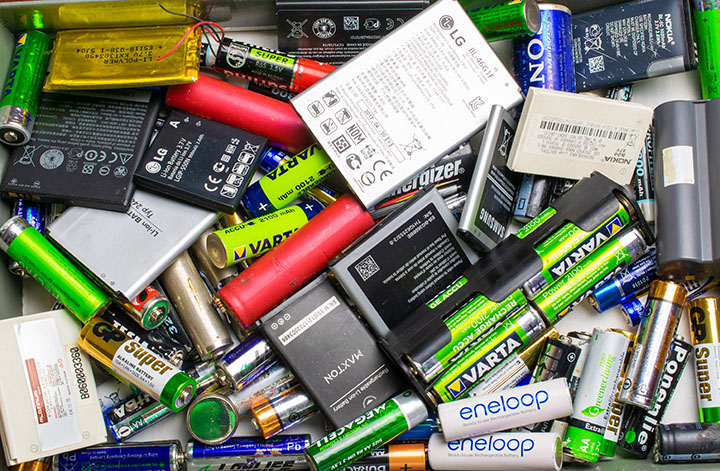
Batteries can and should be recycled.
Batteries contain metals such as mercury, lead, cadmium, nickel, and silver, which can pose a threat to human health and safety as well as the environment.
Some batteries (e.g., lithium-ion) also contain cobalt and lithium, which are considered critical minerals, meaning they are essential in our society. When a battery is thrown away, those resources can never be recovered.
Improper disposal of batteries, particularly those containing lithium, can cause fires or explosions. Additionally, responsible battery recycling keeps millions of pounds of critical, potentially harmful metals out of the landfill and in use. In South Carolina, recycling options are available.
Where to Properly Recycle Batteries
- Many South Carolina counties have household hazardous material collection programs and/or single-day collection events that accept certain types of batteries – both single-use and rechargeable. To determine if your community has access to a program or event, visit RecycleHereSC.
- Rechargeable batteries can be properly recycled at major retailers (e.g., Lowe’s, Best Buy, The Home Depot) that participate in the Call2Recycle program. The program is free to residents and accepts Lithium-Ion (Li-ion), Nickel Cadmium (Ni-Cd), Nickel-Metal Hydride (Ni-MH), and Nickel-Zinc (Ni-ZN) batteries as well as small lead-acid batteries. To find a recycling location near you visit Call2Recycle.
- Single-use batteries weighing up to 11 pounds including AA, AAA, 9V, C, D, button cells, and small lead-acid batteries can be recycled through the Call2Recycle program at some participating retailers.
- Rechargeable batteries can be properly recycled at Batteries Plus retail locations. To find a recycling location, visit Batteries Plus.
- Redwood Materials recycles rechargeable devices as well as lithium-ion (Li-ion) and nickel-metal hydride (Ni-MH) batteries. Residents can drop off batteries and devices at a growing number of locations and events around the state - for details, visit Redwood Materials.
How to Recycle Right
The first rule in managing batteries safely is to always follow the manufacturer’s instructions. Here are additional tips on preparing batteries for recycling.
- Collect and sort your batteries by type (e.g., lithium-ion, alkaline). Put on latex gloves to avoid any possible contact with powder or acid that can burn your skin. Click here for information about identifying battery types.
- Tape the terminals. Energy and heat can be generated when the terminals of seemingly dead batteries touch. Use clear packing tape to cover the ends, eliminating the possibility of fire.
- Tape all button or coin shaped batteries and all lithium batteries whether rechargeable or single use.
- Store batteries properly. Whether you immediately drop off batteries for recycling or save them for a later trip, it is important to place them in a safe container. Do not place the batteries in a junk drawer or bag – use a plastic or cardboard container.
- Isolate any damaged batteries. Store them in their own container. When you drop off batteries to be recycled, let staff know.

